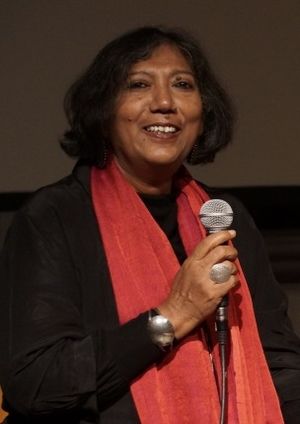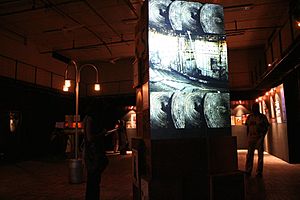Madhusree Dutta facts for kids
Madhusree Dutta is an Indian filmmaker, writer, and curator. A curator is someone who organizes and presents art or other collections.
Contents
About Madhusree Dutta
Madhusree Dutta was born in Jamshedpur, India. She studied Economics at Jadavpur University in Kolkata. She also studied drama at the National School of Drama in New Delhi. In 1987, she moved to Mumbai, which was then called Bombay.
Madhusree Dutta has been a judge at many film festivals. These include the Berlinale (Berlin International Film Festival) in 2015. She was also a judge at the Feminale: International Women's Film Festival in Cologne in 2006. She chaired the jury at the International Documentary and Short Film Festival of Kerala in 2009.
Her films have been shown in special collections at various festivals. These include the Mumbai International Documentary Festival in 2018. She currently lives in Cologne, Germany. Since 2018, she has been the Artistic Director of the Akademie der Künste der Welt in Cologne.
Madhusree Dutta received a Lifetime Achievement Award for documentaries. This award was given at the 12th International Documentary and Short Film Festival of Kerala (IDSFFK).
Her Work
Madhusree Dutta combines art, activism, and teaching in her work. In 1990, she organized EXPRESSION, the first feminist arts festival. This festival brought together women scholars, artists, and activists. It was a very important event for feminism in India.
Her work often explores how gender is understood in society. She also looks at how cities grow and change. She explores public art and how documentaries are made. Her projects often mix different art forms. They combine serious art with more popular art. Her work shows her many roles as an activist and an artist. She has worked with many artists. These include filmmaker Philip Scheffner and photo artist Ines Schaber. She also worked with theater director Anuradha Kapur and visual artist Nilima Sheikh.
She has also created several digital projects. These projects help save and share information online. One project, Godaam, is available on a free website called PADMA.
Madhusree Dutta helped start Majlis in 1990. This group works on cultural activism and women's rights in Mumbai. She was the executive director until March 2016. She also helped found the Akademie Der Künste Der Welt in Cologne. She is a member of the academic council for the School of Environment & Architecture in Mumbai. She has been very active in the women's movement in India. She also contributed to the World Social Forum. She helped by creating and sharing art for these movements.
In October 2015, she joined a nationwide protest. Writers and filmmakers in India protested against government cultural policies. As part of this protest, she returned her National Awards.
Theatre Work
Dutta started her career with a Bengali theatre group called Anarjya in Kolkata. She was also part of Sachetana, a feminist group in Kolkata. For both groups, she directed plays for stages and street performances. Two of her most famous plays from this time are a Bengali version of Bertolt Brecht's Mother Courage and Her Children. The other was an anti-dowry musical called Meye Dile Sajiye (Giving Away the Girl).
In Mumbai, she also worked in theatre for a few years. She then became more involved with visual arts. In 1988, she directed a popular street play for the women's movement. It was called Nari Itihas ki Talash mein (In search of Women's History). In 1991, she directed Aaj Pyar Bandh (Love is on Strike). This play was based on Aristophanes’ Lysistrata. She even directed a 13-episode TV show in Gujarati from 1989 to 1990.
Films She Made
Her first film was I Live in Behrampada (1993). This documentary was about a Muslim neighborhood in Mumbai. It was made after some community conflicts in 1992-93. The film won a Filmfare Award for best documentary in 1994. It became an important film for studying conflicts. The script was even published in a book.
Since then, she has made many other films. These include documentaries, short films, and non-fiction features. Most of her films are made with the same team. This team includes cameraman Avijit Mukul Kishore and editor Shyamal Karmakar. Her 2006 film, Seven Islands and A Metro, was about the city of Mumbai. It was one of the first documentaries to be shown in movie theaters in India. Besides making her own films, she has also produced documentaries for younger filmmakers. She helps and guides new filmmakers in Mumbai. Her films have won three National Film Awards.
Curating Art Projects
From 2009 to 2013, Madhusree Dutta curated "Project Cinema City". This was a research project that combined different art forms. The project explored the many ways Mumbai and its cinema are connected. It showed that making movies involves a lot of work and people. It connected cinema to people moving for jobs. It also looked at how cities change and grow.
The project included making documentary films. It also featured public art displays and teaching courses. Publications and archives were also part of the project. It was first shown at the Berlinale (Berlin International Film Festival) in 2010. Later, it was shown in art galleries in Mumbai, Delhi, and Bangalore. It was also displayed in smaller galleries and public places from 2011-14.
Awards and Recognition
Madhusree Dutta has received many awards for her work:
- 1996, 2001: National Film Award, India
- 1995: Second Best Film Award, International Video Fest
- 1998: Best Public Service Advertisement Award
- 2001: Best Script award in Shanghai International Film Festival
- 2001: IDPA Awards for best Kannada film and best Bengali film
- 2005: HIVOS Culture Award for Asia region
- 2007: Special Jury Award in Film Southasia
- 2012: John Abraham Best Documentary award (as producer)
- 2019: Kölner Kulturpreis "Cultural Manager of the year 2018"
- Lifetime Achievement Award, International Documentary and Short Film Festival of Kerala (IDSFFK)
- She has also received several awards from citizens.



